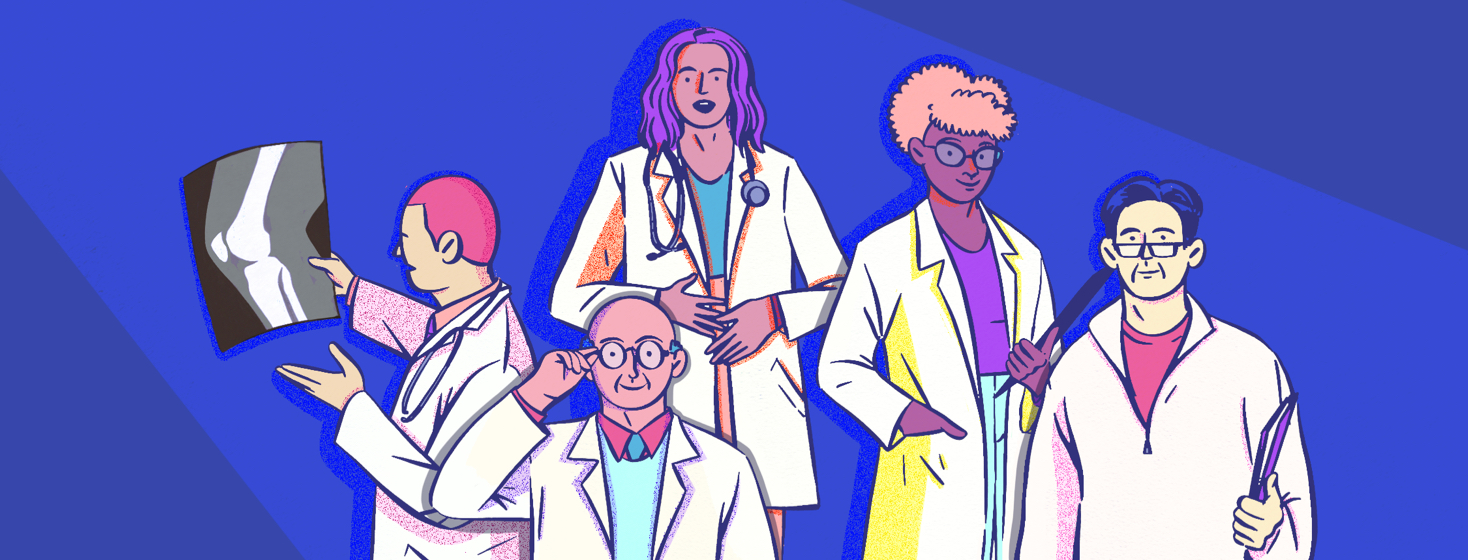Doctors and Specialists Who Treat X-Linked Hypophosphatemia
Reviewed by: HU Medical Review Board | Last reviewed: July 2023 | Last updated: April 2025
People with X-linked hypophosphatemia (XLH) develop a wide range of symptoms such as weak bones and teeth, fractures, fatigue, and muscle weakness. This life-long condition requires treatment on several fronts to improve bone health and quality of life.1
A doctor knowledgeable about XLH will need to coordinate a team of specialists to ensure the well-being of a person with XLH. Because a variety of bodily functions are affected by XLH, this team may include:1
- Orthopedist
- Endocrinologist
- Pain management specialist
- Dentist
- Physical and occupational therapists
- Dietitian
- Audiologist
- Genetic counselor
Primary care doctor
A primary care provider (PCP) may also be called a family doctor, pediatrician, or internist. Some PCPs are physician assistants or nurse practioners rather than MDs. This type of doctor provides general medical care such as for sore throats, vaccines, or sports physicals for student athletes. They have general medical training and are skilled at treating a variety of conditions.2,3
However, this type of doctor is not a specialist, and people with X-linked hypophosphatemia need doctors knowledgeable about XLH. Still, a primary care doctor may play a role in your care.1
Orthopedist or orthopedic surgeon
Orthopedists are doctors with a specialty in managing and treating bone and joint problems, weakness, fractures, pain, and arthritis seen in people with XLH.4
Orthopedic surgeons operate on bones and joints to repair damage caused by the weak and misshapen bones and joints common to XLH.1,4
Endocrinologist
An endocrinologist is a doctor who specializes in hormone imbalances and conditions caused by those imbalances. People with X-linked hypophosphatemia often have growth delays caused by their condition, so an endocrinologist may be needed to support healthy growth and development. Because XLH is a disease of the metabolism, these doctors are often involved in treatment.5/sup>
Pain management specialist
Pain management specialists are doctors who have special training in treating all kinds of pain. Pain may be caused by surgery, nerve damage, or genetic conditions like X-linked hypophosphatemia. Pain is a symptom of XLH when the bones and joints grow out of alignment or the muscles, tendons and ligaments are strained.1,6
Dentist
XLH causes the teeth to become weak and for frequent infections to occur. These infections are also called abscesses. A dentist can help a person with XLH manage their condition better and treat the infections.2
Physical therapist and occupational therapist
A physical therapist (PT) helps people with movement issues. They may design a personalized exercise program that reduces pain, improves joint flexibility, and builds muscle strength. They may also suggest mobility devices and other equipment.7
An occupational therapist (OT) focuses on improving a person’s independence. For instance, they may help someone learn techniques for dressing or cooking for themselves without help. An OT may:7
- Suggest devices and accommodations for home, work, and school
- Work with schools and workplaces to improve accessibility
- Suggest ways to preserve energy
Dietitian
A dietitian or nutritionist may be needed to create a special diet for a person with X-linked hypophosphatemia. People with XLH may benefit from a diet rich in phosphorous, vitamin D, and calcium.2
Audiologist
Hearing loss is another common symptom of XLH, so people with the condition may need to see an audiologist. An audiologist conducts tests to measure hearing loss and fits people for hearing aids.2,8
Genetic counselor
Genetic counselors are medical professionals, often doctors, who help diagnose people with inherited conditions. They recommend genetic tests, interpret the results, and help people understand their diagnosis.9
Having a team of different medical specialists helps people with XLH lead healthier, more enjoyable and productive lives.2

Join the conversation